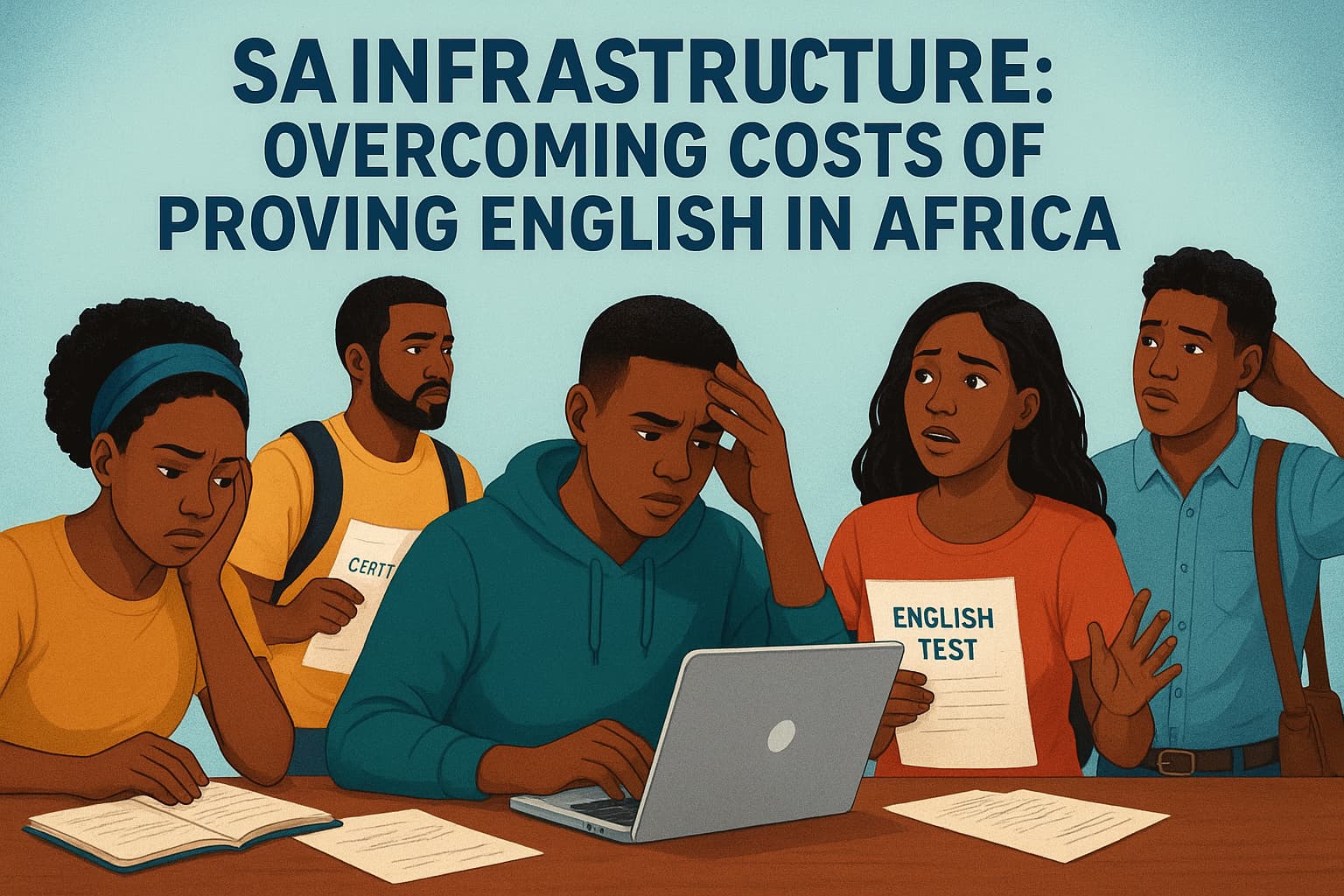SA Infrastructure: Shocking Costs Africans Pay to Prove English
In many parts of Africa, speaking English fluently is a given for millions, yet proving this skill often comes with steep financial and bureaucratic hurdles. The question remains: why must Africans pay to demonstrate something they already know? SA Infrastructure highlights the hidden barriers, examining the costs associated with exams, certifications, and institutional demands that affect education, employment, and global opportunities.
These challenges are more than mere inconveniences; they shape the way Africans access professional pathways and higher education. From exam fees to mandatory certifications, the costs add up, leaving talented individuals frustrated and under pressure. SA Infrastructure explores five shocking aspects of these hidden costs and their impact on millions of Africans.
Understanding these barriers is critical for policymakers, employers, and educators. With the rise of global mobility and remote work, English proficiency is increasingly essential, but the systems in place often penalize the very people who have mastered the language. SA Infrastructure calls for transparency, equity, and practical solutions to remove unnecessary financial and procedural obstacles.
1. Expensive Certification Exams
Many Africans face high costs to certify English proficiency. Exams such as TOEFL, IELTS, and Cambridge certifications often require hundreds of dollars, which is prohibitive in countries with lower average incomes. SA Infrastructure emphasizes that these expenses are not just monetary burdens, they can determine career trajectories and access to international education.
The exam fees, combined with preparation costs like courses and study materials, create a financial barrier that discourages many from pursuing opportunities abroad. These hidden costs highlight systemic inequalities, where speaking English is a basic skill, yet proving it becomes a privilege afforded only to those who can pay.
Furthermore, the scheduling, travel, and administrative expenses tied to these certifications add to the frustration. SA Infrastructure highlights that many highly skilled individuals are unnecessarily delayed or excluded because the certification system is rigid and costly.
2. Institutional Requirements and Bureaucracy
Beyond exam fees, African professionals and students often encounter institutional bureaucracy demanding English proof. Universities, employers, and government agencies frequently request official documentation that costs time and money to obtain. SA Infrastructure notes that these procedures create inefficiencies, forcing applicants to navigate complex systems just to validate a skill they already possess.
This bureaucratic maze disproportionately affects those in rural or underserved areas, who may lack access to certified centers or official channels. The hidden costs include not only fees but travel, time off work, and lost opportunities. SA Infrastructure argues that digital verification systems could simplify the process and reduce unnecessary expenses.
In many cases, institutions require multiple forms of proof, even if one is sufficient. This duplication adds stress and frustration, with candidates paying repeatedly for services that feel redundant. SA Infrastructure emphasizes the need for policy reform and more inclusive solutions.
3. Limited Free Resources and Preparation Material Costs
Many candidates must also invest in expensive preparation materials. While some online resources exist, comprehensive training for English certification exams often comes at a high price. SA Infrastructure highlights that limited access to free or affordable resources creates an uneven playing field, where only those who can pay are fully prepared.
Textbooks, online courses, practice exams, and tutoring fees can easily surpass the exam cost itself. For students from lower-income backgrounds, these costs become prohibitive, effectively excluding them from higher education or job opportunities abroad. SA Infrastructure calls attention to the need for accessible and equitable learning resources.
Even when free resources are available, they often fail to cover the full syllabus or exam requirements. SA Infrastructure advocates for partnerships between educational institutions and non-profits to expand access to quality, low-cost English preparation programs.
4. Hidden Costs of Re-examinations and Retakes
Failing an English certification exam can be costly. Many Africans face the financial burden of retaking exams, paying the same high fees multiple times. SA Infrastructure highlights that these hidden costs often discourage candidates, adding emotional stress and financial strain on families. The stakes are high, and repeated failures can block access to jobs or educational opportunities abroad.
Moreover, the lack of affordable retake options or flexible scheduling makes the process rigid. SA Infrastructure calls for institutions to provide more lenient policies or scholarship-based retakes, helping talented individuals overcome financial barriers while maintaining high standards of assessment.
For many professionals, this cost is compounded by time away from work and the need for additional preparation. The repeated financial and logistical strain reinforces inequality, preventing deserving candidates from fully leveraging their English proficiency.
5. Geographic and Accessibility Barriers
Location often adds hidden costs. Many exam centers and certification agencies are located in major urban areas, far from rural populations. SA Infrastructure emphasizes that travel expenses, accommodation, and lost wages increase the real cost of proving English. For many Africans, these costs make it practically impossible to participate in international opportunities despite having the required skills.
To address this, SA Infrastructure encourages remote examination options, proctoring technology, and mobile testing centers. Such innovations would reduce financial burdens, democratize access, and allow talented individuals in remote areas to compete on equal footing. Learn more about international English exams.
Reducing these barriers not only benefits candidates but also enhances workforce diversity and global collaboration. Making English certification more accessible ensures that talent, rather than geography or income, dictates success.
6. Employer and University Verification Fees
Even after passing exams, additional verification is often required by employers or universities. SA Infrastructure highlights that these agencies may charge processing fees to validate certificates or transcripts. These costs, while smaller than exam fees, accumulate and create unnecessary financial pressure on applicants.
Verification delays can further impact opportunities, particularly for time-sensitive applications or contracts. SA Infrastructure suggests that digital verification platforms could streamline this process, reducing costs and speeding up acceptance into universities or employment abroad. For example, our internal guide provides practical solutions for reducing verification expenses.
By addressing verification fees and bureaucracy, organizations can make the process fairer and more efficient, ensuring that applicants are judged by their skills rather than their ability to pay multiple administrative fees.
7. Language Proficiency and Career Limitations
Even with strong English skills, Africans often face career barriers if they cannot provide official proof. SA Infrastructure emphasizes that employers use certifications as a gatekeeping tool, which can prevent qualified candidates from advancing. This creates a paradox: the skill exists, but without payment and formal proof, opportunities are limited.
Professionals in fields such as international business, tech, and academia are especially affected. The financial and administrative burdens associated with certification exams can stall promotions or job applications. SA Infrastructure calls for recognition of alternative evidence of proficiency, like practical experience or employer endorsements, to reduce unnecessary costs.
Addressing these barriers not only benefits individuals but also strengthens the labor market by ensuring skilled candidates are not sidelined due to procedural hurdles.
8. Socioeconomic Disparities Exacerbate Costs
Socioeconomic status dramatically influences the ability to pay for English verification. SA Infrastructure highlights that individuals from lower-income backgrounds are disproportionately impacted, often unable to afford exams, preparation materials, or verification fees. This inequality perpetuates cycles of disadvantage in education and employment.
To bridge this gap, SA Infrastructure advocates for scholarship programs, subsidized exams, and public-private partnerships. By reducing financial obstacles, countries can unlock human potential and improve social mobility, ensuring that English proficiency is an asset, not a burden.
Equitable access to certification not only benefits candidates but also contributes to national development, as a more skilled workforce attracts global investment and opportunities.
9. Hidden Fees in Global Mobility Programs
Africans seeking education or work abroad often encounter hidden fees in visa and mobility programs. SA Infrastructure notes that these programs frequently require English certification as part of the application process, adding further financial strain. From consular fees to mandatory translation services, the total cost can be daunting.
These hidden expenses discourage talented individuals from pursuing international opportunities. SA Infrastructure recommends transparency in program requirements and cost-sharing initiatives to minimize financial stress, making global mobility more accessible and fair.
Reducing these fees allows applicants to focus on preparation and skill development rather than financial survival, fostering a more competitive and capable workforce.
10. Calls for Systemic Reform and Future Solutions
Ultimately, SA Infrastructure stresses the need for systemic reform to make proving English affordable and accessible. Digital verification, flexible exam options, and recognition of practical skills can reduce unnecessary costs and bureaucratic hurdles. Countries and institutions should collaborate to create fairer, more inclusive systems that reward ability over financial capacity.
Innovations like online proctoring, mobile testing centers, and open-access preparation resources can transform the current landscape. SA Infrastructure envisions a future where Africans are judged by their skills, not by their ability to pay, ensuring equal opportunities across education, employment, and global mobility.
By addressing the hidden costs of proving English, SA Infrastructure highlights both the challenges and the solutions necessary for a fairer, more equitable future. Removing financial and procedural barriers will empower millions and enhance Africa’s contribution to the global workforce.
Conclusion
SA Infrastructure uncovers the hidden costs Africans face when proving English proficiency, from exam fees and preparation materials to bureaucratic and verification hurdles. These barriers perpetuate inequality and limit opportunities despite existing skills. Reforming certification systems, embracing digital solutions, and ensuring equitable access are crucial steps. By reducing unnecessary costs, Africa can unlock its talent and enable millions to thrive in education, employment, and international opportunities.




